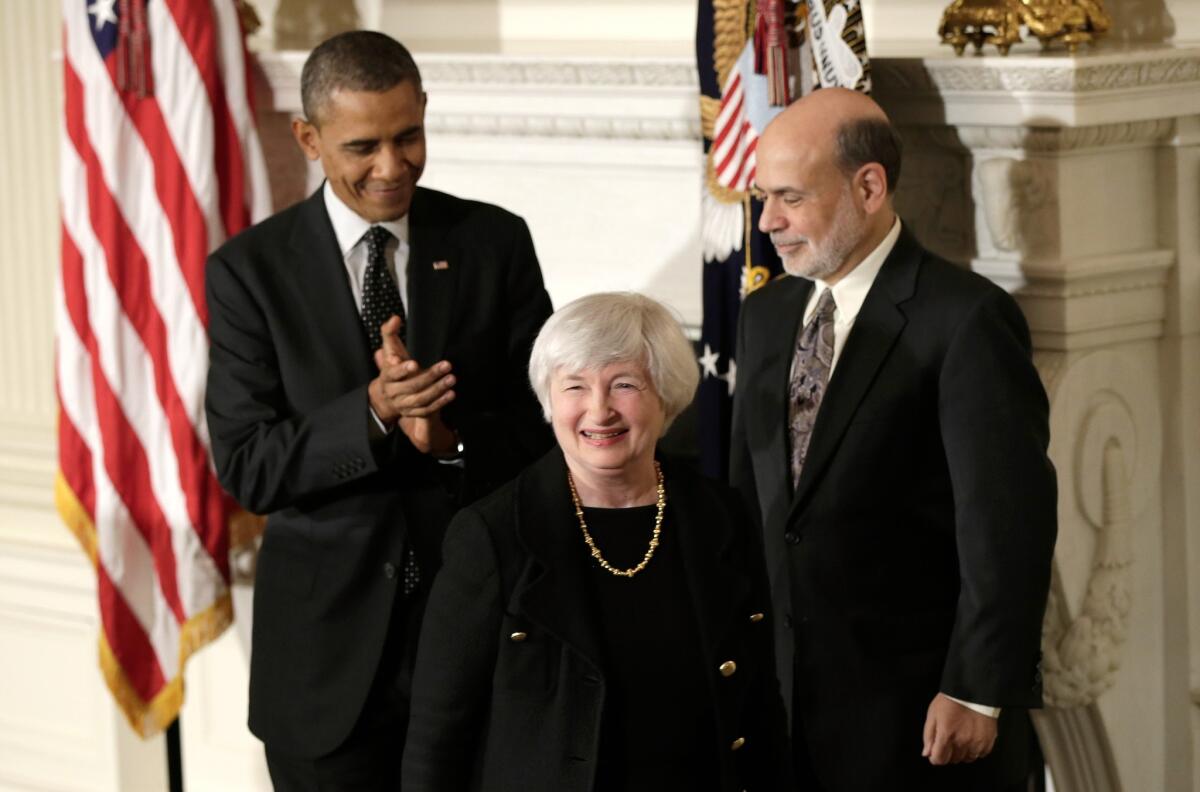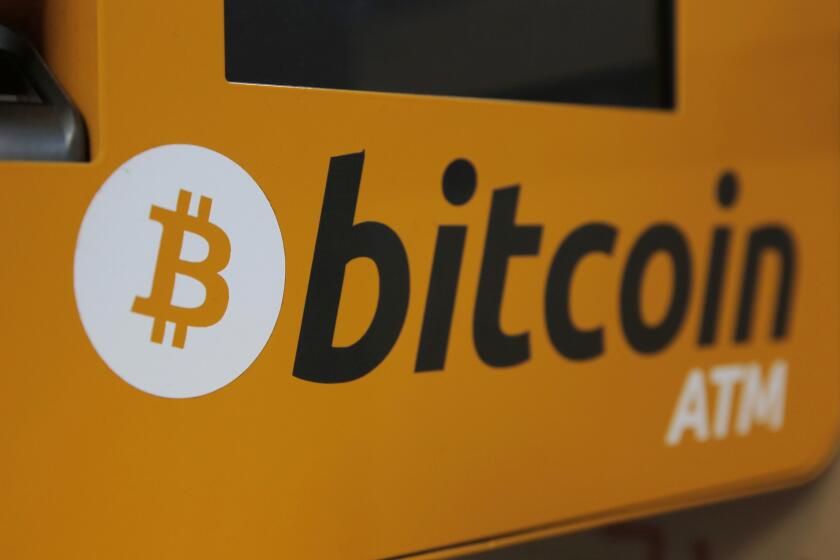Is the Fed politically biased? Look at its interest-rate decisions as elections near

Janet L. Yellen smiles as President Obama and Ben Bernanke applaud her during a news conference to announce her nomination to chair the Federal Reserve in 2013.
Reporting from Washington — The presidential election was exactly four weeks away and Federal Reserve policymakers were wrestling with the potential political blowback of lowering a key interest rate to stimulate the economy.
One official said he “thought it was conventional wisdom that we weren’t expected to act so close to an election,” according to a transcript of the closed-door Oct. 6, 1992 meeting. Another said that there was “a strong argument that the credibility” of the rate-setting Federal Open Market Committee “would be hurt by our doing something close to an election.”
Finally, Fed Chairman Alan Greenspan weighed in.
“I wish we had the luxury to sit back and do nothing until after the election as is the conventional procedure of the Federal Open Market Committee,” he said. “I don’t think we have that luxury.” Nonetheless, the committee voted not to change rates.
Every four years, the independent Fed faces the same predicament: how to try to manage the economy without appearing to favor either party’s presidential candidate.
Those concerns will be front and center this week as Fed policymakers meet to consider a small hike in their benchmark short-term interest rate in the midst of a heated campaign.
But this time the stakes are higher because of sharp criticism of the central bank from both major political parties. And experts said that probably reduces the already low chances of a rate hike before the election.
Last week, Republican presidential nominee Donald Trump fired his latest shot at the Fed. He said Fed Chairwoman Janet L. Yellen “should be ashamed of herself” for keeping the rate near zero for so long.
“It’s staying at zero because she’s obviously political and doing what Obama wants her to do,” Trump told CNBC.
Yellen is a Democrat who was nominated by Obama in 2013, although she’s continuing the low-rate policies begun by her predecessor, Ben S. Bernanke, a registered Republican in 2005 when he was first nominated for the job by President George W. Bush.
A rate hike could slow the economy and that might hurt the chances of Democratic presidential nominee Hillary Clinton, whose economic policies are largely a continuation of Obama’s.
Clinton said Trump shouldn’t be commenting on Fed monetary policy actions. But she’s been critical of the Fed for other reasons.
This past spring, Clinton joined many top liberals in criticizing the lack of diversity in the Fed’s leadership and called for bankers to be banned from serving on the boards of the 12 regional Fed banks.
Yellen has said that the upcoming election won’t factor into the Fed’s interest-rate decisions.
“We are very focused on assessing the economic outlook and making changes that are appropriate without taking politics into account,” Yellen said at a June news conference when asked about the effect of the election.
But history shows that a desire at the Fed to appear non-partisan has made rate increases rare in the weeks before a presidential election.
That has helped pushed down the odds of a small hike this week — already a long shot because of some lackluster economic data — to about 15%, according to a closely watched barometer by the CME Group futures exchange.
Investors and analysts have mostly written off any chance of an increase at the Fed’s next meeting on Nov. 1-2 because that is even closer to Election Day.
“The Fed tries very hard not to do things in the months of September, October and November before the election … so they don’t appear to be helping one candidate or the other,” said Allan H. Meltzer, a Fed historian at Carnegie Mellon University.
Bernadette Kilroy Martin, associate director of the GailFosler Group, a business advisory firm, studied the impact of presidential elections on interest rate moves and found only one hike within two months of an election – in 2004 – since the Fed’s rate-setting committee began announcing its decisions in 1984.
Economic conditions in 1988 and 1996 pointed toward the need for increases, but the Fed held off on moves within two months of the election, Martin found.
The Fed has cut the interest rate within two months of a presidential election on three occasions since 1984, she said.
A rate increase is designed to slow the economy while a rate cut, which lowers the cost of borrowing, is intended to stimulate growth.
Fed policymakers inched down the rate by a quarter percentage point in early September 1992, But they surprised investors by not lowering the rate again at the meeting a month later during which Greenspan said Fed officials didn’t have the luxury of waiting until after the election.
Speculation that the Fed has affected presidential elections — intentionally or not — are not new.
White House tape recordings show that President Richard Nixon pressured Fed Chairman Arthur Burns to enact an expansionary monetary policy to improve Nixon’s chances of re-election in 1972. Burns pushed such a policy through the Fed, though it’s not clear if it was because of the pressure.
Interest rate hikes to battle high inflation in the late 1970s under Fed Chairman Paul Volcker are partly blamed for President Jimmy Carter’s defeat in 1980.
And former President George H.W. Bush attributed his 1992 reelection loss to Greenspan’s failure to cut interest rates more aggressively during the 1990-91 recession.
“I reappointed him and he disappointed me,” Bush said in a 1998 TV interview.
Transcripts of Fed meetings immediately before presidential elections show some talk of the economic effects of political uncertainty and concerns about how actions could be interpreted.
“It seems to me that a large number of us are concerned too about the perception as well as the substance of a large drop in interest rates engineered by the Fed in the next critical five to six weeks,” Anthony Solomon, president of the Federal Reserve Bank of New York, said according to a transcript of a meeting on Oct. 2, 1984.
Volcker, a Democrat appointed by Carter and reappointed in 1983 by President Ronald Reagan, declared he was “not very impressed” with “all the various political or semi-political sensitivities.” The Fed cut the rate at the meeting. Reagan was reelected in a landslide a month later.
Former Fed Vice Chairman Donald Kohn, who retired in 2010 after a long career at the central bank, said it was “as non-political an institution … as you could design.”
“I’ve never heard anyone — and I went to 30 years of FOMC meetings — say we should do this because in some sense it would favor one side, or the other or we shouldn’t do it for political reasons,” said Kohn, now a senior fellow at the Brookings Institution think tank. “It really hasn’t been a factor.”
Still, because the Fed chair and governors are nominated by the president, questions about their political leanings arise during campaigns.
Fed Gov. Lael Brainard, who Obama nominated in 2014 after she served as a top Treasury official in his administration, has fueled such speculation by contributing $2,700 to Clinton’s campaign. Fed policymakers aren’t barred from giving money to presidential campaigns, but such contributions are unusual.
John B. Taylor, a senior fellow at the Hoover Institution think tank, said the Fed could better protect itself from political pressures by establishing specific rules for when the Fed would increase or decrease its key interest rate.
Yellen and Bernanke have balked at such decision-making because they said it would be too rigid. But House Republicans, who like Taylor have been sharply critical of the Fed’s unprecedented stimulus policies of recent years, have introduced legislation that would require the central bank to come up with a rule and explain when policymakers deviate from it.
“If you have a strategy and have principles that are known to people, then you automatically resist pressure from the outside,” said Taylor, who authored the most well-known, rule-based approach.
Former House Financial Services Committee Chairman Barney Frank (D-Mass.) doesn’t think the economy is strong enough for a rate hike right now. But he said the risk that a hike before the election would be interpreted politically is another reason for the Fed to stand pat.
“This close to an election, there should be a bias toward not acting rather than acting,” he said.
Follow @JimPuzzanghera on Twitter
More to Read
Inside the business of entertainment
The Wide Shot brings you news, analysis and insights on everything from streaming wars to production — and what it all means for the future.
You may occasionally receive promotional content from the Los Angeles Times.












